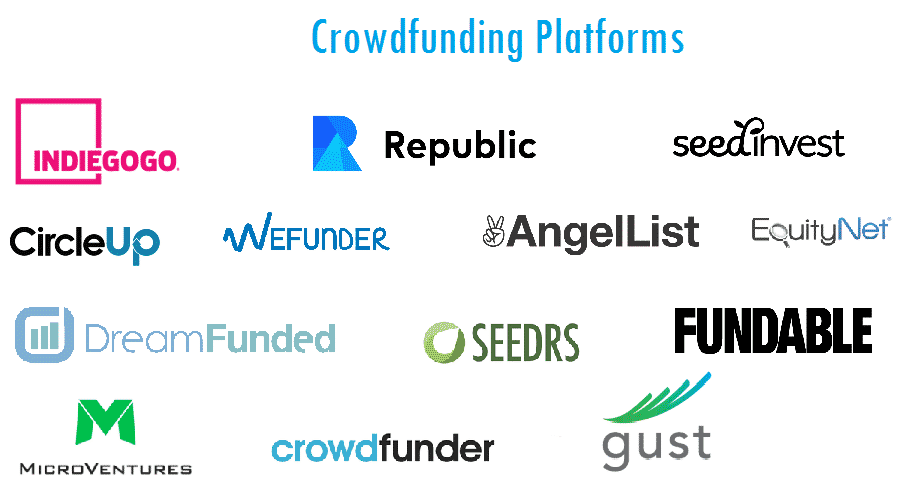Every startup needs capital and manpower at the initial stages to run their business. Startup founders look for different and new ways to raise money than the conventional method of raising money. Some of the older methods have been venture funding, angel investors and seed funding. Now, the startups have one more option available i.e. Crowdfunding platforms. Crowdfunding platforms are the fastest and simplest way of arranging resources. They are like social media platforms that connect startups with investors and other interested people who are willing to be the owner of small businesses.
There are several crowdfunding platforms that work on behalf of startups and connect them with people. They also help startups in getting feedback on the product, marketing and finding the right people. Several tech startups need funds to build mobile apps. Simpalm, an software development company for startups can work with you and build an MVP app. This MVP app, you can demonstrate to contributors on the following platforms to raise the fund and build the final products.
1. Types of Crowdfunding Platforms
Before you select a crowdfunding platform for your startup, you should be aware of its types. Here are different types of Crowdfunding platforms:
1.1 Equity Crowdfunding
It is the most popular and traditional form of crowdfunding for startups because they connect them with investors who are willing to invest a large amount in small businesses. The startups sell a part of their equity to the investor or a group of investors. On the other hand, the investors will provide funding to the startups and support them in running business forward.
1.2 Reward Crowdfunding
It is a type of crowdfunding that allows the startup’s founders to ask for the donation from the investors for a specific project and investors will get some sort of reward from the company. It is mainly used by non-profits, social enterprises, and small businesses. To get funds entrepreneurs to have to create a campaign, then the investors contribute to them in return for the product and services.
1.3 Debt Crowdfunding
In this type of crowdfunding, startups or business owners borrow the funds from the individuals, investor instead of the bank or financial institutions. The funds are borrowed at a fixed annual interest rate, and the repayment of the payday loan amount is also structured similar to that of the traditional business loan. However, selecting a personal loan might offer more flexibility depending on your financial needs.
2. List of Top Crowdfunding Platforms for the Startups
2.1 Kickstarter
Kickstarter is one of the best-known crowdfunding sites. It was launched in 2009 and to date, it has successfully funded more than $3.7 billion to more than 1,40,000 projects. They help artists, musicians, filmmakers, designers, and other creators in arranging suitable resources, to support them to make their ideas a reality. It is a competitive crowdfunding site that carefully selects projects that can be highly creative to life. They have launched their products that are also successful including the Pebble Watch, the Ouya game console, and Reading Rainbow reboot. They fund the startups that are located in places, such as the US, UK, Canada, Australia, New Zealand, and the Netherlands. It is free to create a project on Kickstarter, but if a startup project is successfully funded, then they charge 5 percent of the funded amount. They also charge payment fees: 3% + $0.20 per pledge $10 and over; 5% + $0.05 per pledge under $10.
2.2 Indiegogo
Indiegogo offers startups with live funding campaigns as well as a marketplace for innovative products. This is because they have more focused on tech and innovation startups. After Kickstarter, IndieGoGo is the best-known crowdfunding platform that was launched in 2008. This platform allows people to get funds for their ideas, charity, or start-up business. They get the startups funded through reward-based crowdfunding like investors, individuals who are interested in investing in small businesses as donation and charity, and not for having equity. They have helped several entrepreneurs and startups and funded more than 650,000 projects with raising around 1 billion dollars. In 2016, they have partnered with MicroVentures to offer equity-based campaigns to the startups who are willing for it. Indiegogo does not provide the startups and entrepreneurs with specific deadlines and targets for fundraising. They do not have to stop fundraising after a specific period. They charge 5 percent of the raised amount as a platform fee for all projects. If you’re raising money for a particular cause, then they will not charge any money.
2.3 Seedinvest
Seedinvest is an equity crowdfunding based platform that connects startups with the investors or group of investors. It was originally created in 2012 but launched in 2013. They have focused on developing liquidity on their platform by connecting with the high net worth individuals, families, professionals, and early-stage businesses. Therefore, they are more focused on a single industry i.e. technology startups. In 2014, they have entered into a partnership with Angel Investing website Gust. Through this platform, startups can raise funds by equity or convertible note funding. For equity funding, startups have to provide their pre-money valuation. On the other hand, for convertible notes, they have to provide valuation cap, conversion discount, interest rate, and term length. The startups that are ready to make their business big connects with them. They should consider a waiting period of a minimum of 60 days for processing. The startups that are located in the united states are considered for funding. They charge 7.5 percent of the total amount raised and 5 percent of equity fees after a successful campaign. Along with that, they charge payment fees of $0 form the startup and 2% from the investor.
2.4 CircleUp
CircleUp is a crowdfunding platform that provides capital in the form of equity, credit or both. They provide funds to the early-stage startups that are focused on developing consumer brands/products. They believe in creating a transparent and efficient market to carry out innovation for consumer brands. This platform offers startups and entrepreneurs with the services, such as connecting with the investors, insights from machine-learning technology, and access to special lines of credit for startups. They don’t charge any fees for funding friends and family investment. Along with that they also provide the startups with special access to funding through partnerships with Procter & Gamble and General Mills.
2.5 GofundMe
Gofundme is an internationally recognized platform that connects startups with investors, individuals who are willing to put the money for any charitable cause. They help people to raise funds for social causes, such as celebrations and graduations to challenging circumstances like accidents and illnesses. Since many donors contribute to charitable campaigns, it’s important for organizations to create a donation receipt to ensure tax compliance and transparency.They have successfully raised funds of more than $ 5 billion for more than two million individual campaigns and 50 million donors. This platform does not charge any funding fees from the startups if the raised funds are for personal campaigns in the US. If the fundraising is for charities and countries outside the US is 5 percent and they can keep all the raised funds. They also charge payment fees of 2.9% + $0.30 per transaction.
2.6 Fundable
Fundable is a flat fee-based crowdfunding platform because they provide their services based on a monthly subscription. The startups can create a campaign to raise funds, till they have a subscription to this platform. This platform manually approves the campaigns of the startups after they verify that they have met the prescribed terms and conditions. This platform has a focus on healthy startups that are ready to grow big. The startups are offered to raise funds through both the equity-based and reward-based campaigns. This platform also provides startups with consulting services that help to prepare fundraising strategies for businesses/ startups. They will help you from designing your assets to the marketing of your products. The only problem with this platform is that you have to pay monthly subscription whether your campaign is successful or not. This platform charges a funding fee on a monthly subscription basis of around $180. On the other hand, they charge a payment fee of around 3.5% + $0.30 per transaction for reward campaigns.
2.7 iFundWomen
Ifundwomen is the only crowdfunding platform that is specially designed to support the early stage, female entrepreneurs. This platform not only helps them with fundraising activities but also provides them with coaching, creativity, and connection to help them in growing their ideas. They believe that the combination of community and technology can drive women entrepreneurs with more opportunities. They provide the opportunity to the entrepreneurs to create a 45-day campaign for their startups. This is because it is a low-risk way to test the market for products and services. They coach the entrepreneurs in pitching investors, planning strategies, budgeting, and pre-marketing for the successful launch of their campaign. For their services, they charge funding fees of around 5 percent of the raised funds and payment fees of 2.9% + $0.30 per transaction.
2.8 Crowdrise
Crowdrise is a crowdfunding platform that raises funds through charitable donations. It was launched in 2010 and in 2017, Gofundme has acquired it. This platform is based on the belief in the concept of giving and taking that help them to connect with more people and enable them to donate more funds. For engaging the investors in the fundraising and donations, they use gamification and provide rewards to them. For their services, they charge funding fees from the non-profit organization of 5 percent of the fundraised and payment fees of 2.9% + $0.30 per donation.
2.9 Crowdfunder
Crowdfuder is a leading equity funding and sourcing platform that helps high growth ventures with a network of more than 2,00,000 entrepreneurs and investors. They believe that entrepreneurs are the most powerful forces that can change the economy and society. When they are provided with sufficient resources, such as capital and education. They have funded more than 1000 entrepreneurs to build their startups into high growth ventures. With their network of more than 12,000 venture capital and angel investors, they have raised more than $1,60,000 million for the startups. To create a campaign on this platform is available at a monthly subscription. They do not charge any fees to create an account. When you start a campaign on this platform, they will charge around $299 per month and for premium is around $ 500 per month.
2.10 WeFunder
WeFunder is a crowdfunding platform that helps the startup in fundraising through its network of accredited investors. It is equity-based funding, which means investors are provided with the equities on behalf of undertaking startup. They are also based on an idea that any person other than accredited investors having wealth can invest in a company. It is free to create a campaign on this platform and they do not charge any funding fees or administration fees. On the other hand, they charge administrative fees from the investors that cover all the operating costs of the platform.

 App Development
App Development Web Engineering
Web Engineering AI Services
AI Services Health / Fitness
Health / Fitness Education
Education Social
Social Nonprofit
Nonprofit Fintech
Fintech Logistics
Logistics Government
Government HR Software
HR Software About Simpalm
About Simpalm Our News
Our News Client Testimonials
Client Testimonials Careers
Careers Awards
Awards Resources
Resources Information
Information












